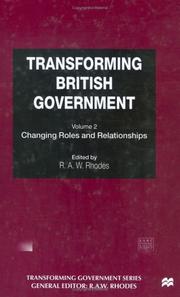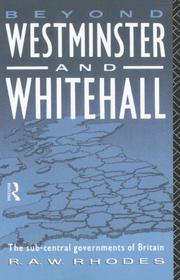| Listing 1 - 10 of 50 | << page >> |
Sort by
|
Book
ISBN: 9780199601141 0199601143 9780198735793 0198735790 Year: 2011 Publisher: Oxford Oxford University Press
Abstract | Keywords | Export | Availability | Bookmark
 Loading...
Loading...Choose an application
- Reference Manager
- EndNote
- RefWorks (Direct export to RefWorks)
As citizens, why do we care about the everyday life of ministers and civil servants? We care because the decisions of the great and the good affect all our lives, for good or ill. For all their personal, political, and policy failings and foibles, they make a difference. So, we want to know what ministers and bureaucrats do, why, and how. We are interested in their beliefs and practices.In his fascinating piece of political anthropology, Rod Rhodes uncovers exactly how the British political elite thinks and acts. Drawing on unprecedented access to ministers and senior civil servants in three government departments, he answers a simple question: 'what do they do?' On the basis of extensive fieldwork, supplemented by revealing interviews, he tries to capture the essence of their everyday life. He describes the ministers' and permanent secretaries' world through their own eyes, and explores how their beliefs and practices serve to create meaning in politics, policy making, and public-service delivery. He goes on to analyze how such beliefs and practices are embedded in traditions; in webs of protocols, rituals, and languages.The story he has to tell is dramatized through in-depth accounts of specific events to show ministers and civil servants 'in action'. He challenges the conventional constitutional, institutional, and managerial views of British governance. Instead, he describes a storytelling political-administrative elite, with beliefs and practices rooted in the Westminster model, which uses protocols and rituals to domesticate rude surprises and cope with recurrent dilemmas.(Provided by publisher)
Political sociology --- Great Britain --- Legislators --- Cabinet officers --- Parlementaires --- Ministres --- Grande-Bretagne --- Officials and employees --- Politics and government --- Fonctionnaires --- Politique et gouvernement --- Officials and employees. --- #SBIB:328H214 --- #SBIB:324H41 --- #SBIB:35H6014 --- Instellingen en beleid: Verenigd Koninkrijk --- Politieke structuren: elite --- Bestuur en beleid: nationale en regionale studies: Verenigd Koninkrijk
Book
ISBN: 3319766341 331976635X Year: 2018 Publisher: Cham : Springer International Publishing : Imprint: Palgrave Macmillan,
Abstract | Keywords | Export | Availability | Bookmark
 Loading...
Loading...Choose an application
- Reference Manager
- EndNote
- RefWorks (Direct export to RefWorks)
This book examine polices through the eyes of the practitioners, both top-down and bottom-up; it decentres policies and policymaking. To decentre is to unpack practices as the contingent beliefs and actions of individuals. Decentred analysis produces detailed studies of people’s beliefs and practices. It challenges the idea that inexorable or impersonal forces drive politics, focusing instead on the relevant meanings, the beliefs and preferences of the people involved. The book presents ten case studies, covering penal policy, zero-carbon homes, parliamentary scrutiny, children’s rights, obesity, pension reform, public service reform, evidence-based policing, and local economic knowledge. It introduces a different angle of vision on the policy process; it looks at it through the eyes of individual actors, not institutions. In other words, it looks at policies from the other end of the telescope. It concludes there is much to learn from a decentred approach. It delivers edification because it offers a novel alliance of interpretive theory with an ethnographic toolkit to explore policy and policymaking from the bottom-up. Written by members of the Department of Politics and International Relations of the University of Southampton, with their collaborators at other universities, the book’s decentred approach provides an alternative to the dominant evidence–based policy nostrums of the day. R. A. W. Rhodes is Professor of Government at the University of Southampton, UK. Previously, he was the Director of the UK Economic and Social Research Council’s ‘Whitehall Programme’ (1994-1999); Distinguished Professor of Political Science at the Australian National University (2006-11); and Director of the Research School of Social Sciences at the Australian National University (2007-8). In 2015, the ECPR awarded him its biennial Lifetime Achievement Award for his ‘outstanding contribution to all areas of political science, and the exceptional impact of his work’.
Political science. --- Comparative politics. --- Public policy. --- Great Britain --- European Union. --- Political Science and International Relations. --- Public Policy. --- Governance and Government. --- Legislative and Executive Politics. --- Comparative Politics. --- British Politics. --- European Union Politics. --- Comparative political systems --- Comparative politics --- Government, Comparative --- Political systems, Comparative --- Political science --- Administration --- Civil government --- Commonwealth, The --- Government --- Political theory --- Political thought --- Politics --- Science, Political --- Social sciences --- State, The --- Politics and government. --- Political planning. --- Research. --- Planning in politics --- Public policy --- Planning --- Policy sciences --- Politics, Practical --- Public administration --- Legislative bodies. --- Great Britain-Politics and gover. --- Bicameralism --- Legislatures --- Parliaments --- Unicameral legislatures --- Constitutional law --- Estates (Social orders) --- Representative government and representation --- Great Britain—Politics and government. --- Comparative government.
Book
ISBN: 0191827797 9780191827792 0191089338 Year: 2017 Publisher: Oxford : Oxford University Press,
Abstract | Keywords | Export | Availability | Bookmark
 Loading...
Loading...Choose an application
- Reference Manager
- EndNote
- RefWorks (Direct export to RefWorks)
This volume looks forward and explores the 'interpretive turn' and its implications for the craft of political science, especially public administration, and draws together articles from 2005 onwards on the theme of 'the interpretive turn' in political science.
Political science. --- Administration --- Civil government --- Commonwealth, The --- Government --- Political theory --- Political thought --- Politics --- Science, Political --- Social sciences --- State, The
Digital
ISBN: 9783319766355 Year: 2018 Publisher: Cham Springer International Publishing :Imprint: Palgrave Macmillan
Abstract | Keywords | Export | Availability | Bookmark
 Loading...
Loading...Choose an application
- Reference Manager
- EndNote
- RefWorks (Direct export to RefWorks)
This book examine polices through the eyes of the practitioners, both top-down and bottom-up; it decentres policies and policymaking. To decentre is to unpack practices as the contingent beliefs and actions of individuals. Decentred analysis produces detailed studies of people’s beliefs and practices. It challenges the idea that inexorable or impersonal forces drive politics, focusing instead on the relevant meanings, the beliefs and preferences of the people involved. The book presents ten case studies, covering penal policy, zero-carbon homes, parliamentary scrutiny, children’s rights, obesity, pension reform, public service reform, evidence-based policing, and local economic knowledge. It introduces a different angle of vision on the policy process; it looks at it through the eyes of individual actors, not institutions. In other words, it looks at policies from the other end of the telescope. It concludes there is much to learn from a decentred approach. It delivers edification because it offers a novel alliance of interpretive theory with an ethnographic toolkit to explore policy and policymaking from the bottom-up. Written by members of the Department of Politics and International Relations of the University of Southampton, with their collaborators at other universities, the book’s decentred approach provides an alternative to the dominant evidence–based policy nostrums of the day. R. A. W. Rhodes is Professor of Government at the University of Southampton, UK. Previously, he was the Director of the UK Economic and Social Research Council’s ‘Whitehall Programme’ (1994-1999); Distinguished Professor of Political Science at the Australian National University (2006-11); and Director of the Research School of Social Sciences at the Australian National University (2007-8). In 2015, the ECPR awarded him its biennial Lifetime Achievement Award for his ‘outstanding contribution to all areas of political science, and the exceptional impact of his work’.
Political systems --- Internal politics --- International relations. Foreign policy --- Politics --- Economic policy and planning (general) --- Law --- Public administration --- obesitas --- overheid --- politiek --- recht --- politie --- Europese instellingen --- Europese politiek --- binnenlandse politiek --- European Union --- Great Britain --- Europe
Book
ISBN: 9780198786115 0198786115 Year: 2017 Publisher: Oxford Oxford University Press
Abstract | Keywords | Export | Availability | Bookmark
 Loading...
Loading...Choose an application
- Reference Manager
- EndNote
- RefWorks (Direct export to RefWorks)
Interpretive Political Science' is the second of two volumes featuring a selection of key writings by R.A.W. Rhodes. Volume II looks forward and explores the 'interpretive turn' and its implications for the craft of political science, especially public administration, and draws together articles from 2005 onwards on the theme of 'the interpretive turn' in political science. Part I provides a summary statement of the interpretive approach, and Part II develops the theme of blurring genres and discusses a variety of research methods common in the humanities, including: ethnographic fieldwork, life history, and focus groups. Part III demonstrates how the genres of thought and presentation found in the humanities can be used in political science. It presents four examples of such blurring 'at work' with studies of: applied anthropology and civil service reform; women's studies and government departments; and storytelling and local knowledge. The book concludes with a summary of what is edifying about an interpretive approach, and why this approach matters, and revisits some of the more common criticisms before indulging in plausible conjectures about the future of interpretivism. The author seeks new and interesting ways to explore governance, high politics, public policies, and the study of public administration in general. 0.
Book
Year: 1995 Publisher: Oxford Blackwell
Abstract | Keywords | Export | Availability | Bookmark
 Loading...
Loading...Choose an application
- Reference Manager
- EndNote
- RefWorks (Direct export to RefWorks)
Book
ISBN: 1840140453 Year: 2000 Publisher: Aldershot Ashgate
Abstract | Keywords | Export | Availability | Bookmark
 Loading...
Loading...Choose an application
- Reference Manager
- EndNote
- RefWorks (Direct export to RefWorks)

ISBN: 0333752430 Year: 2000 Publisher: Basingstoke Palgrave
Abstract | Keywords | Export | Availability | Bookmark
 Loading...
Loading...Choose an application
- Reference Manager
- EndNote
- RefWorks (Direct export to RefWorks)

ISBN: 0415079071 Year: 1992 Publisher: London Routledge
Abstract | Keywords | Export | Availability | Bookmark
 Loading...
Loading...Choose an application
- Reference Manager
- EndNote
- RefWorks (Direct export to RefWorks)
Local government --- -Great Britain --- Politics and government.
Book
Year: 1991 Publisher: Oxford Blackwell
Abstract | Keywords | Export | Availability | Bookmark
 Loading...
Loading...Choose an application
- Reference Manager
- EndNote
- RefWorks (Direct export to RefWorks)
| Listing 1 - 10 of 50 | << page >> |
Sort by
|

 Search
Search Feedback
Feedback About UniCat
About UniCat  Help
Help News
News